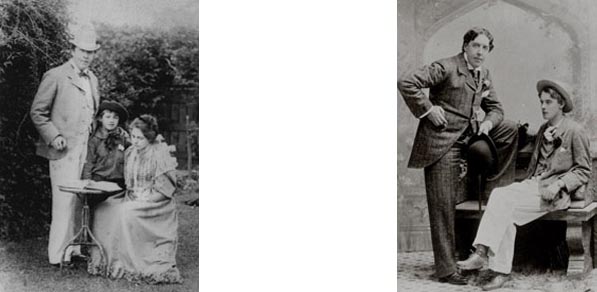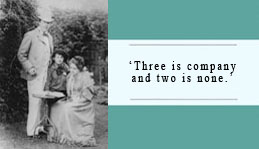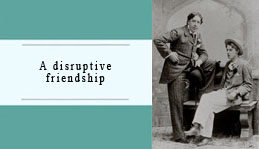
left: Oscar and Constance Wilde with their son Cyril in 1892, © Merlin Holland
right: Oscar Wilde and Lord Alfred Douglas (Bosie), photographed at Magdalen College, Oxford in May 1893, © National Portrait Gallery
Chapter 1: ‘Three is company and two is none’ – A Disruptive Friendship
The first chapter of Oscar Wilde’s Scandalous Summer begins with a brief account of the early course of Wilde’s marriage, focusing on the gradual decline on his part from love into indifference – a process accelerated by the arrival of Lord Alfred Douglas in his life. The account of the marriage is interwoven with a straightforward account of the development of Wilde’s writing career.
Evidence is provided that the period during which Wilde’s marriage was sexually active was almost certainly of less than two years, and that the period during which Wilde and Bosie were sexually involved was – contrary to what is often assumed – of just a few months.
There follows an account of the summer of 1893 – a summer that was in some ways a parallel to the Worthing summer of 1894. At the heart of it lay the stay at a house that Wilde rented at Goring-on-Thames, where much of An Ideal Husband was written. Also included is the extraordinary story of how Robbie Ross, Bosie and Wilde all engaged (separately) in sexual activity with a sixteen-year-old schoolboy called Claude Dansey, a scandalous episode that came close to having disastrous consequences.
The extract that follows is the section of Chapter 1 that addresses the physical side of Wilde’s relationship with Lord Alfred Douglas and the financial demands that Douglas made on him.
The event that brought Wilde and Bosie together – a foretaste of problems to come – was Bosie’s being blackmailed in the spring of 1892 by a youth in Oxford over an indiscreet letter Bosie had sent him. Bosie wrote to Wilde asking for help. Wilde travelled down to Oxford and spent the weekend at Bosie’s lodgings in the High Street. Back in London, he went to see his solicitor, George Lewis, who resolved the matter by arranging for the blackmailer to be paid a hundred pounds. Recourse to the law was not an option. If similar good sense had prevailed two years later, Wilde’s downfall, if not necessarily averted, would at least have been postponed.
It was soon after this that Bosie gave in to Wilde’s importunity – probably in May 1892. In a letter of 7 April 1897 from Reading Gaol to his friend More Adey, Wilde wrote: ‘I never remember on any one occasion from May 1892 to April 1895 that A.D. [Alfred Douglas] had any money from either his father or his mother. He came to me for everything.’[1] April 1895 was the momentous month of Wilde’s fall, and the fact that May 1892 is the other month he specifies suggests this was lodged in his mind as the equally momentous month when his relationship with Bosie began in earnest.[2]
The physical side of their relationship, however, was brief, as Bosie later told Frank Harris in explicit terms:
When I first met Wilde he started laying siege to me and I resisted him; not because at that time I had any moral objection to that sort of thing, but simply because with a man older than myself it did not appeal to me. At school and at Oxford I had been neither better nor worse than my contemporaries. What is euphemistically called ‘the schoolboy nonsense’ that goes on among boys at school and at college was perfectly familiar to me and I had participated in it freely … It was not till I had known him for at least six months … that I gave in to him. I did with him and allowed him to do just what was done among boys at Winchester and Oxford [that is, mutual masturbation] … Sodomy never took place between us [though] he added what was new to me and was not (as far as I know) known or practised among my contemporaries: he ‘sucked’ me … Much as I was fascinated by Wilde and much as I really in the long run adored and was ‘crazy’ about him, I never liked this part of the business. It was dead against my sexual instincts which were all for youth and beauty and softness. After a time he tumbled to the fact that I didn’t like it at all and only consented to it to oblige him, and he very soon ‘cut it out’ altogether.[3]
Nonetheless each man fell in love with the other, in different ways and for different reasons. Douglas was a powerful cocktail. He was young, slim, and good-looking. He was amusing and intelligent, though lazy. Inspired by Wilde, he started writing poetry, and soon became an accomplished sonneteer. He was the son of a Marquess, and Wilde, in spite of his 1891 essay about socialism, was more of a snob than he was a socialist. There was also the happy coincidence that Bosie was an undergraduate at the college of which Wilde had been a member – Magdalen, the most beautiful and the most ‘aesthetic’ of Oxford’s colleges.
Bosie, for his part, was captivated by Wilde’s wit and charm, and doubtless by his celebrity; and of course it is always beguiling to be loved ‘wildly, passionately, devotedly, hopelessly’, as Algernon was later to claim to love Cecily in The Importance of Being Earnest. But there was a darker and more complex side to the relationship. Being adored gives power to the object of adoration, and Douglas misused the power he had over Oscar. Wilde put this succinctly in ‘De Profundis’: ‘The basis of character is will-power, and my will-power became absolutely subject to yours.’[4]
According to Wilde, this darker side manifested itself in Bosie’s attitude to money. As we saw earlier, Wilde claimed that between 1892 and 1895 Bosie relied entirely on Wilde for money. This, however, cannot be true. Initially Bosie received an allowance from his father of £250 a year [£25,000 today] – an adequate sum for a man with no responsibilities, if he was not extravagant – although Queensberry withdrew this after Bosie refused to give up his friendship with Wilde.
Nonetheless Wilde certainly spent a great deal of money on Bosie. But the issue was not just the outlay itself, which Wilde claimed was the principal factor in the financial difficulties in which he found himself by 1894. It was also Bosie’s unattractive attitude to Wilde’s financial support. In ‘De Profundis’ Wilde says that early in their friendship Bosie’s mother had warned Oscar that Bosie’s two chief faults were vanity, and being ‘all wrong about money’.
Wilde says it did not take him long to see what Bosie’s mother had meant:
Your insistence on a life of reckless profusion: your incessant demands for money: your claim that all your pleasures should be paid for by me whether I was with you or not: brought me after some time into serious monetary difficulties … You demanded without grace and received without thanks. … But it was no pleasure to me to have to pay every single thing for you from your morning shave to your midnight hansom. It was a horrible bore … your living on me was a matter in which my wishes were not consulted for a moment. It was simply a peculiar, and to me personally most distressing, form that your devotion to me took.[5]
In his 1914 book Oscar Wilde and Myself Bosie furiously rejected these accusations:
Even in those early days I spent a great deal more money on Wilde than he spent on me ... so far as my money was concerned, we had a common purse. It never occurred to me to refuse him anything … It is grotesquely untrue that he wasted any appreciable part of his substance on me.[6]
As often, neither Wilde nor Bosie can be fully believed. ‘De Profundis’ was written when the balance of Wilde’s mind was disturbed, and he demonised Bosie. scar Wilde and Myself was a furious and venomous riposte to ‘De Profundis’, by someone whose balance of mind was arguably always disturbed. And, while Wilde was often guilty of exaggeration in ‘De Profundis’, Bosie was sometimes guilty of outrageous lies.
The most preposterous of these is the claim he made in Oscar Wilde and Myself that, when Wilde was charged: ‘He assured me that the suggestions and accusations against him were quite false and without foundation. I had not the smallest reason to believe that he was lying to me.’ It was, wrote Bosie, only when he visited Wilde when he was in Holloway prison on remand that Wilde told him that ‘in a way’ the charges against him were true: ‘I was shocked at what he told me.’ Also, in one of the most breathtaking displays of hypocrisy in literary history, Douglas – more promiscuous with boys even than Wilde – says that Wilde was charged ‘for having made a low, squalid and abominable brute of himself’.[7]
1. Complete Letters, p. 795.
2. A May date lies between two other dates given elsewhere. On p. 27 of Lord Alfred Douglas (Methuen, 1984), H. Montgomery Hyde writes: ‘It was also probably at this time, during the Easter vacation in 1892, that Bosie eventually gave in to Wilde.’ Neil McKenna says that ‘the love of Oscar and Bosie was consummated in the early hours of a June morning at Tite Street’ (The Secret Life of Oscar Wilde, p. 185), but no source is given.
3. Letter from Lord Alfred Douglas to Frank Harris, 20 March 1925.
4. Complete Letters, p. 689.
5. Complete Letters, pp. 687-8 & pp. 767-8.
6. Alfred Bruce Douglas, Oscar Wilde and Myself (John Long, 1914), pp. 84-6.
7. Douglas, Oscar Wilde and Myself, pp. 96-7; pp. 112-3; p. 102. Bosie later repudiated this book – see Chapter 8, note 18.

